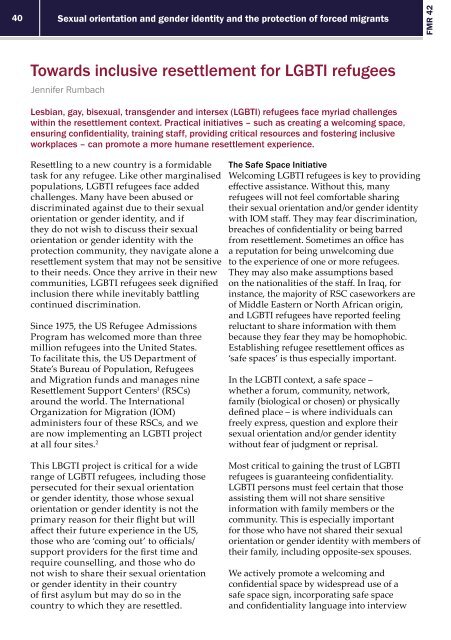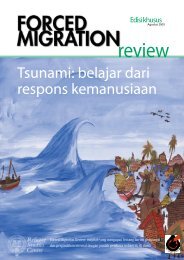FMR 42 full issue pdf - Forced Migration Review
FMR 42 full issue pdf - Forced Migration Review
FMR 42 full issue pdf - Forced Migration Review
Create successful ePaper yourself
Turn your PDF publications into a flip-book with our unique Google optimized e-Paper software.
40 Sexual orientation and gender identity and the protection of forced migrants<br />
<strong>FMR</strong> <strong>42</strong><br />
Towards inclusive resettlement for LGBTI refugees<br />
Jennifer Rumbach<br />
Lesbian, gay, bisexual, transgender and intersex (LGBTI) refugees face myriad challenges<br />
within the resettlement context. Practical initiatives – such as creating a welcoming space,<br />
ensuring confidentiality, training staff, providing critical resources and fostering inclusive<br />
workplaces – can promote a more humane resettlement experience.<br />
Resettling to a new country is a formidable<br />
task for any refugee. Like other marginalised<br />
populations, LGBTI refugees face added<br />
challenges. Many have been abused or<br />
discriminated against due to their sexual<br />
orientation or gender identity, and if<br />
they do not wish to discuss their sexual<br />
orientation or gender identity with the<br />
protection community, they navigate alone a<br />
resettlement system that may not be sensitive<br />
to their needs. Once they arrive in their new<br />
communities, LGBTI refugees seek dignified<br />
inclusion there while inevitably battling<br />
continued discrimination.<br />
Since 1975, the US Refugee Admissions<br />
Program has welcomed more than three<br />
million refugees into the United States.<br />
To facilitate this, the US Department of<br />
State’s Bureau of Population, Refugees<br />
and <strong>Migration</strong> funds and manages nine<br />
Resettlement Support Centers 1 (RSCs)<br />
around the world. The International<br />
Organization for <strong>Migration</strong> (IOM)<br />
administers four of these RSCs, and we<br />
are now implementing an LGBTI project<br />
at all four sites. 2<br />
The Safe Space Initiative<br />
Welcoming LGBTI refugees is key to providing<br />
effective assistance. Without this, many<br />
refugees will not feel comfortable sharing<br />
their sexual orientation and/or gender identity<br />
with IOM staff. They may fear discrimination,<br />
breaches of confidentiality or being barred<br />
from resettlement. Sometimes an office has<br />
a reputation for being unwelcoming due<br />
to the experience of one or more refugees.<br />
They may also make assumptions based<br />
on the nationalities of the staff. In Iraq, for<br />
instance, the majority of RSC caseworkers are<br />
of Middle Eastern or North African origin,<br />
and LGBTI refugees have reported feeling<br />
reluctant to share information with them<br />
because they fear they may be homophobic.<br />
Establishing refugee resettlement offices as<br />
‘safe spaces’ is thus especially important.<br />
In the LGBTI context, a safe space –<br />
whether a forum, community, network,<br />
family (biological or chosen) or physically<br />
defined place – is where individuals can<br />
freely express, question and explore their<br />
sexual orientation and/or gender identity<br />
without fear of judgment or reprisal.<br />
This LBGTI project is critical for a wide<br />
range of LGBTI refugees, including those<br />
persecuted for their sexual orientation<br />
or gender identity, those whose sexual<br />
orientation or gender identity is not the<br />
primary reason for their flight but will<br />
affect their future experience in the US,<br />
those who are ‘coming out’ to officials/<br />
support providers for the first time and<br />
require counselling, and those who do<br />
not wish to share their sexual orientation<br />
or gender identity in their country<br />
of first asylum but may do so in the<br />
country to which they are resettled.<br />
Most critical to gaining the trust of LGBTI<br />
refugees is guaranteeing confidentiality.<br />
LGBTI persons must feel certain that those<br />
assisting them will not share sensitive<br />
information with family members or the<br />
community. This is especially important<br />
for those who have not shared their sexual<br />
orientation or gender identity with members of<br />
their family, including opposite-sex spouses.<br />
We actively promote a welcoming and<br />
confidential space by widespread use of a<br />
safe space sign, incorporating safe space<br />
and confidentiality language into interview




